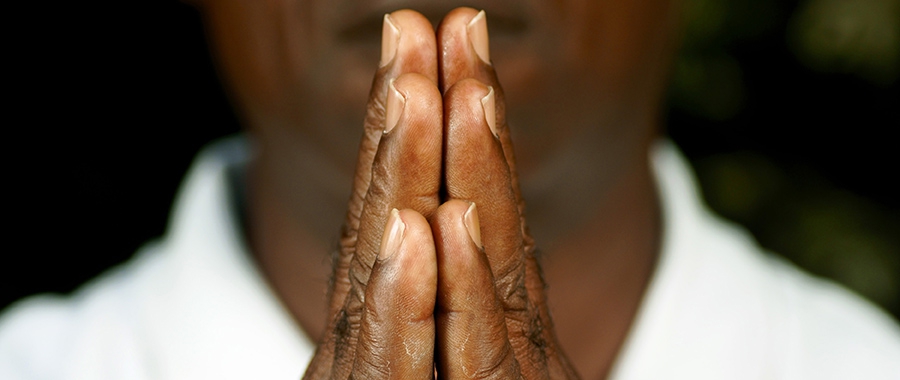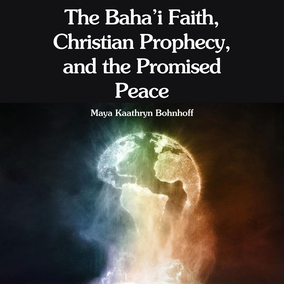The views expressed in our content reflect individual perspectives and do not represent the authoritative views of the Baha'i Faith.
Pray for Peace! the bumper sticker on the car ahead of us said, and my cynical passenger laughed out loud, saying “As if!”
Like my skeptical friend, many people no longer believe that prayer has anything to do with peace or even the possibility of peace. Peace, they conclude, is just an unfulfilled promise, a naïve dream that will never come true—so praying for it is the height of folly and a waste of time.
But consider this: true prayer can change the human heart, and the human heart contains the roots of peace:
It is easy to read the Holy Scriptures, but it is only with a clean heart and a pure mind that one may understand their true meaning. Let us ask God’s help to enable us to understand the Holy Books. Let us pray for eyes to see and ears to hear, and for hearts that long for peace. – Abdu’l-Baha, Paris Talks, p. 57.
The purpose of prayer is to come nearer to God—to pray from the heart fervently. If the heart is pure, it is beautiful for the tongue to express its ecstasy. – Abdu’l-Baha, Star of the West, Volume 2, p. 7.
The state of prayer is the best of conditions, for man is then associating with God. Prayer verily bestoweth life … – Abdu’l-Baha, Selections from the Writings of Abdu’l-Baha, p. 201.
Abdu’l-Baha wrote that “Prayer verily bestoweth life …” because, among other things, it serves to awaken the spirit. That spiritual life, and its love, kindness and compassion, form the deep root system for a peaceful future. When a sufficient number of people share that root system, peace can grow.
Human hearts without those qualities will inevitably turn to violence, whether in word or in deed.
Those who have experienced true prayer know that it can be an intense, transcendent experience which works to produce self-knowledge, self-awareness and a selfless desire to help others. But there is a great difference, the Baha’i teachings say, between prayers said in a rote, unfeeling way, and sincere, heartfelt prayers offered ecstatically to “the author of nature:”
Automatic, formalistic prayers which do not touch the core of the heart are of no avail. How sweet, how delicious, how satisfying, how spiritual is prayer in the middle of the night! While all the eyes are closed the eyes of the worshipper are wide open. While all the ears are stopped the ears of the suppliant are attuned to the subtle music of God. While the majority of the people are fast asleep the adorer of the Ideal Beloved is wakeful. All around him there is a rare and delicate silence, deep, airy, ethereal silence, calm, magical and subtle—and there is the worshipper, communing with nature and the author of nature. – Abdu’l-Baha, Star of the West, Volume 5, p. 45.
In 1918, when World War I finally came to a halt, Abdu’l-Baha said that prayers for peace were “the greatest means for its realization:”
This world-war has come to an end. We trust that at least it will lead to the preliminaries of universal peace, just as it is plainly foretold in the blessed Tablets.
The greatest means for its realization is in the entreaty and supplication of the friends to the Kingdom of God. Ye should all implore and pray, supplicate and beseech that, through the grace of God, this world-consuming war may be changed into a world-illuminating peace. – Abdu’l-Baha, Star of the West, Volume 6, p. 137.
But Baha’is don’t just pray and leave it at that. The Baha’i teachings recommend prayer followed immediately by action—the conscious kindness of actually doing something for someone. Prayer should move the heart to do something, not just be used to make us feel better or more self-satisfied:
Therefore strive that your actions day by day may be beautiful prayers. Turn towards God, and seek always to do that which is right and noble. Enrich the poor, raise the fallen, comfort the sorrowful, bring healing to the sick, reassure the fearful, rescue the oppressed, bring hope to the hopeless, shelter the destitute! – Abdu’l-Baha, Paris Talks, p. 81.
When prayer fulfills that high ideal, it leads to what the Baha’i teachings call “patient lives of active service:”
If we are true Baha’is speech is not needed. Our actions will help in the world, will spread civilization, will help the progress of science, and cause the arts to develop. Without action nothing in the material world can be accomplished, neither can words unaided advance a man in the spiritual Kingdom. It is not through lip-service only that the elect of God have attained to holiness, but by patient lives of active service they have brought light into the world.
Therefore strive that your actions day by day may be beautiful prayers. Turn towards God, and seek always to do that which is right and noble. Enrich the poor, raise the fallen, comfort the sorrowful, bring healing to the sick, reassure the fearful, rescue the oppressed, bring hope to the hopeless, shelter the destitute! – Abdu’l-Baha, Paris Talks, pp. 80-81.
You May Also Like
Comments

















(Paris Talks)